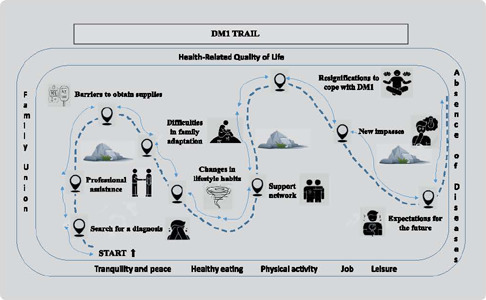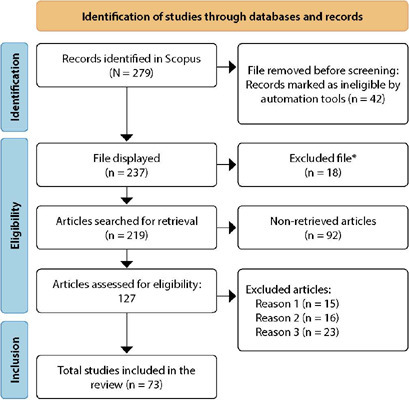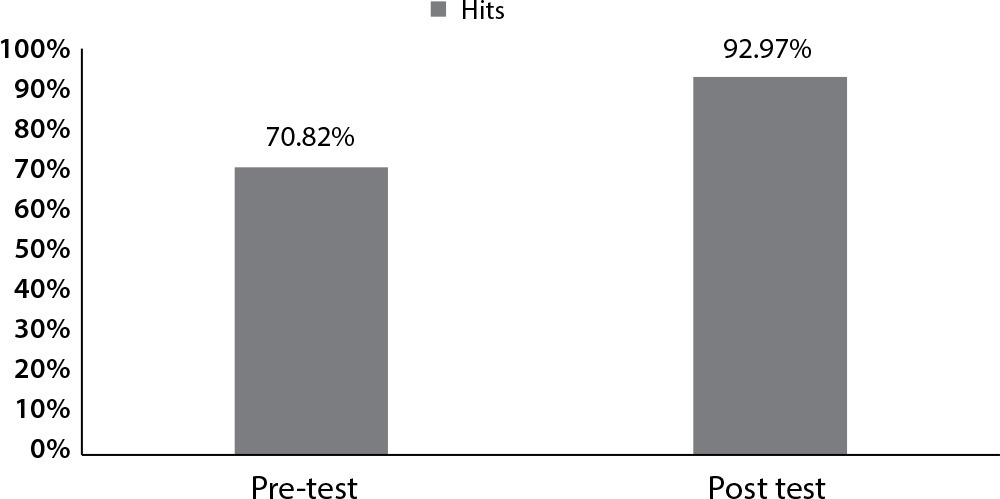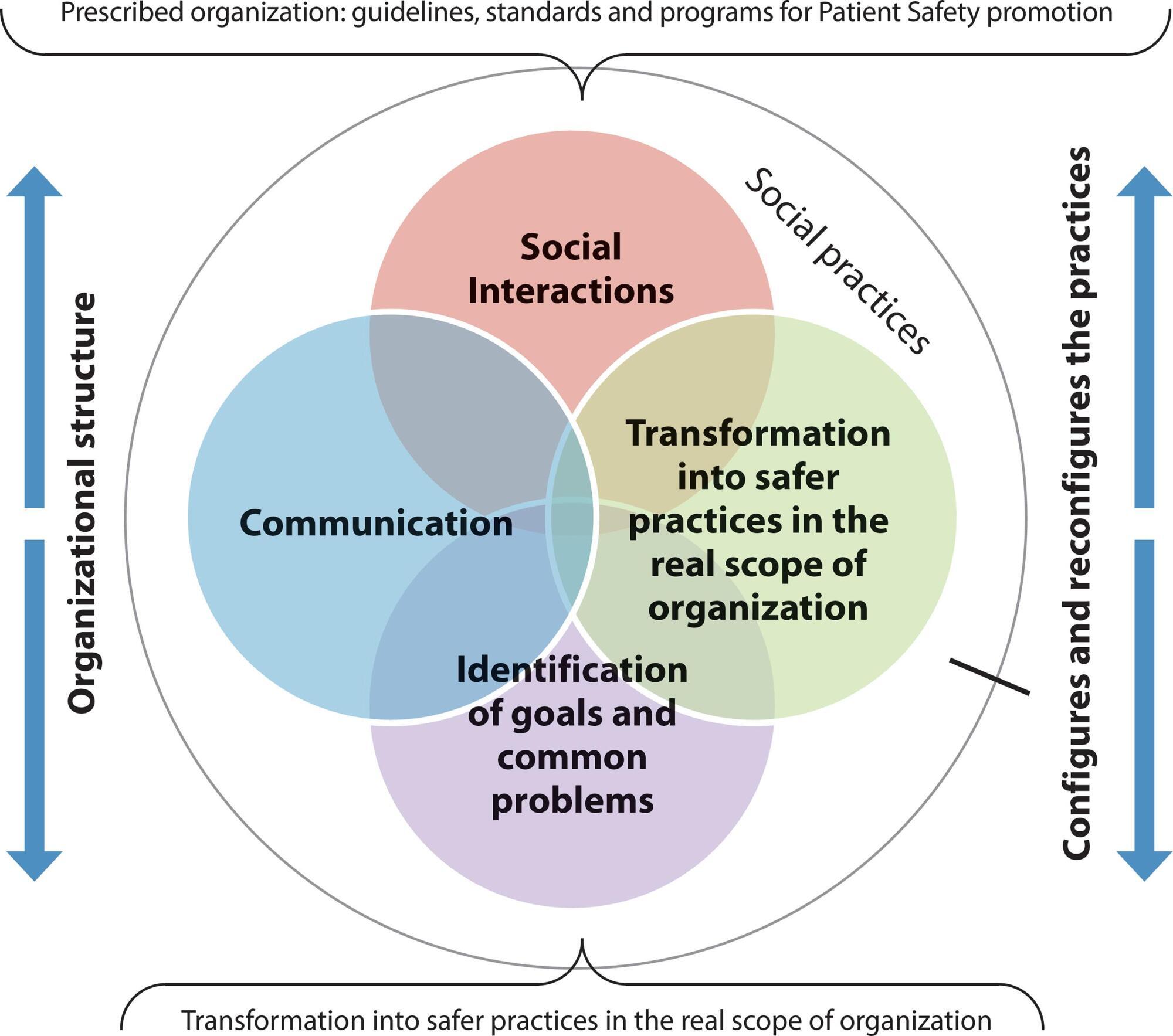-
ERRATUM
ERRATUM
Revista Brasileira de Enfermagem. 2024;77(2):e2024n2e05
06-14-2024
Abstract
ERRATUMERRATUM
Revista Brasileira de Enfermagem. 2024;77(2):e2024n2e05
06-14-2024DOI 10.1590/0034-7167.20247702e05
Views0In the article “Educational technologies used to promote self-care for people with diabetes mellitus: integrative review”, with DOI number: , published in Revista Brasileira de Enfermagem, 2023;76(Suppl 4):e20230049, in the title: Where it read: […]See more -
ERRATUM
ERRATUM
Revista Brasileira de Enfermagem. 2024;77(2):e2024n2e06
06-14-2024
Abstract
ERRATUMERRATUM
Revista Brasileira de Enfermagem. 2024;77(2):e2024n2e06
06-14-2024DOI 10.1590/0034-7167.20247702e06
Views0In the article “Is there scientific relevance to the plot of films and documentaries about eating disorders?”, with DOI number: , published in Revista Brasileira de Enfermagem, 2024;77(1):e20220547, page 7:Where it read:[…]See more -
ORIGINAL ARTICLE
Meanings attributed to health-related quality of life by caregivers of adolescents with diabetes
Revista Brasileira de Enfermagem. 2024;77(2):e20230314
06-14-2024
Abstract
ORIGINAL ARTICLEMeanings attributed to health-related quality of life by caregivers of adolescents with diabetes
Revista Brasileira de Enfermagem. 2024;77(2):e20230314
06-14-2024DOI 10.1590/0034-7167-2023-0314
Views0See moreABSTRACT
Objective:
to interpret the meanings attributed to the health-related quality of life by caregivers of adolescents with type 1 diabetes mellitus.
Methods:
qualitative, descriptive-exploratory study of 14 caregivers of adolescents with diabetes developed at the reference outpatient clinic for endocrine diseases in a city in the state of Paraíba. Interviews were performed between May and September 2021. Inductive thematic analysis of the empirical material, and its interpretation in light of the concepts of health-related quality of life and family functioning were performed.
Results:
the meanings attributed by caregivers to the health-related quality of life of adolescents converged on the feeling of being healthy, healthy eating, satisfactory family income, family involvement in care and effective access to the care network.
Final Considerations:
knowledge of these meanings enables health professionals to develop strategies that meet the unique demands of caregivers experiencing this diagnosis.

-
ORIGINAL ARTICLE
Teoria de médio alcance do diagnóstico de enfermagem sobrepeso
Revista Brasileira de Enfermagem. 2024;77(2):e20230372
06-14-2024
Abstract
ORIGINAL ARTICLETeoria de médio alcance do diagnóstico de enfermagem sobrepeso
Revista Brasileira de Enfermagem. 2024;77(2):e20230372
06-14-2024DOI 10.1590/0034-7167-2023-0372
Views0See moreRESUMEN
Objetivo:
Construir una teoría de rango medio para el diagnóstico de enfermería Sobrepeso en adolescentes y adultos jóvenes.
Métodos:
Estudio metodológico a la luz de los marcos teóricos de Roy y de Lopes, Silva y Herdman. Un total de 3.925 artículos fueron recuperados y evaluados utilizando el software State of the Art Through Systematic Review. La muestra final fue de 28 artículos.
Resultados:
Los resultados convergieron en 3 atributos esenciales, 13 antecedentes y 7 consecuencias. Se construyó una teoría de rango medio compuesta por un diagrama ilustrado, 11 proposiciones y 12 relaciones causales.
Consideraciones finales:
A partir de la creación de la teoría, fue posible comprender mejor el diagnóstico de enfermería Sobrepeso en el contexto de adolescentes y adultos jóvenes. La comprensión de los fenómenos de enfermería contribuye para el avance y fortalecimiento de la ciencia de enfermería.
-
REVIEW
Critical analysis of the scientific production on Jean Watson’s Theory of Human Care
Revista Brasileira de Enfermagem. 2024;77(2):e20230231
06-14-2024
Abstract
REVIEWCritical analysis of the scientific production on Jean Watson’s Theory of Human Care
Revista Brasileira de Enfermagem. 2024;77(2):e20230231
06-14-2024DOI 10.1590/0034-7167-2023-0231
Views0See moreABSTRACT
Objectives:
to analyze current scientific production on the use of the theoretical-methodological precepts of Jean Watson’s Theory of Human Care/Clinical Caritas Process.
Methods:
quantitative, exploratory, descriptive study using data from 1979 to 2023 in the Scopus database. Analysis was carried out using VOSviewer software.
Results:
the 73 studies included establish a network of collaboration among 221 authors from 155 institutions in 18 countries, who discuss the development of ethical behavior in nursing staff, through technical improvement, implementation, and validation of instrumental strategies capable of measuring and evaluating the quality of holistic and empathetic care. The Theory of Human Caring contributes to nursing training and care, and Process Clinical Caritas-Veritas is useful for the different possibilities of practice and education.
Conclusions:
it is important to strengthen with more empirical data a nursing work model centered on individual human care, supporting the evolution of scientific nursing knowledge.

-
ORIGINAL ARTICLE
Sleep duration and quality of Brazilian nursing staff who work in shifts
Revista Brasileira de Enfermagem. 2024;77(2):e20230167
06-14-2024
Abstract
ORIGINAL ARTICLESleep duration and quality of Brazilian nursing staff who work in shifts
Revista Brasileira de Enfermagem. 2024;77(2):e20230167
06-14-2024DOI 10.1590/0034-7167-2023-0167
Views0See moreABSTRACT
Objective:
to analyze sleep duration and sleep quality in nursing professionals who work in shifts.
Method:
this is a cross-sectional, analytical research, carried out between September 2017 and April 2018, at a public hospital in southern Brazil, with the nursing team. A socio-occupational and health symptoms questionnaire, the Epworth Sleepiness Scale, and the Pittsburgh Sleep Quality Index were used. Data are presented as descriptive and inferential statistics, bivariate analysis, and binary logistic regression.
Results:
participants were 308 nursing professionals with a predominance of long-term sleep, absence of drowsiness, and poor sleep quality. Short-term sleep (<6h) was associated with day shift and poor sleep quality. Sleep quality was associated with presence excessive daytime sleepiness and work day shift.
Conclusion:
work shift, insomnia and headache were the main factors related short-term sleep for nursing professionals. The results may justify the development of intervention research for workers’ health.
-
ORIGINAL ARTICLE
Duração e qualidade do sono da equipe de enfermagem brasileira que trabalha em turnos
Revista Brasileira de Enfermagem. 2024;77(2):e20230167
06-14-2024
Abstract
ORIGINAL ARTICLEDuração e qualidade do sono da equipe de enfermagem brasileira que trabalha em turnos
Revista Brasileira de Enfermagem. 2024;77(2):e20230167
06-14-2024DOI 10.1590/0034-7167-2023-0167
Views0See moreRESUMEN
Objetivo:
analizar la duración y calidad del sueño en profesionales de enfermería que trabajan por turnos.
Método:
investigación analítica, transversal, realizada entre septiembre de 2017 y abril de 2018, en un hospital público del sur de Brasil, con el equipo de enfermería. Se utilizó el cuestionario sociolaboral y de síntomas de salud, la Escala de Somnolencia de Epworth y el Índice de Calidad del Sueño de Pittsburgh. Los datos se presentan como estadística descriptiva e inferencial, análisis bivariado y regresión logística binaria.
Resultados:
participaron 308 profesionales de enfermería, con predominio de sueño prolongado, ausencia de somnolencia y mala calidad del sueño. La duración corta del sueño (<6 h) se asoció con turnos de día y mala calidad del sueño. La calidad del sueño se asoció con la presencia de somnolencia diurna excesiva y con el trabajo diurno.
Conclusión:
los turnos de trabajo, el insomnio y la cefalea fueron los principales factores relacionados con la falta de sueño de los profesionales de enfermería. Los resultados pueden justificar el desarrollo de investigaciones de intervención para la salud de los trabajadores.
-
ORIGINAL ARTICLE
Technology for nursing care in a Maternal Intensive Care Unit: a methodological study
Revista Brasileira de Enfermagem. 2024;77(2):e20230202
05-27-2024
Abstract
ORIGINAL ARTICLETechnology for nursing care in a Maternal Intensive Care Unit: a methodological study
Revista Brasileira de Enfermagem. 2024;77(2):e20230202
05-27-2024DOI 10.1590/0034-7167-2023-0202
Views0See moreABSTRACT
Objectives:
to develop and validate a nursing care plan in a Maternal Intensive Care Unit.
Methods:
a methodological study, developed in stages: integrative review; Nursing History construction; care plan restructuring; appearance and content validity by judges.
Results:
the history was organized into sections: Identification; Basic Human Needs; Physical Examination; and Assessment of Basic Human Needs. A care plan was restructured with 34 diagnoses, organized according to basic human needs. A satisfactory level of appearance validity of the history and care plan was obtained (Concordance Index varying between 86.3 and 100 for both instruments), and content validity with average indexes of 90.8 and 92.8, respectively. Thirty-four diagnoses, their interventions and nursing actions were consolidated.
Conclusions:
the instruments were considered relevant and pertinent in terms of appearance and content, and their use in the institution under study as well as in other similar services may be recommended.
-
ORIGINAL ARTICLE
Effect of educational video on newborn care for the knowledge of pregnant and postpartum women and their families
Revista Brasileira de Enfermagem. 2022;75:e20201371
11-10-2022
Abstract
ORIGINAL ARTICLEEffect of educational video on newborn care for the knowledge of pregnant and postpartum women and their families
Revista Brasileira de Enfermagem. 2022;75:e20201371
11-10-2022DOI 10.1590/0034-7167-2020-1371
Views0See moreABSTRACT
Objectives:
to evaluate the effect of educational video on newborn care to increase the knowledge of pregnant, postpartum, and family members.
Methods:
a quasi-experimental study, with pre-intervention and post-intervention evaluation with a single group. Fifty-eight pregnant, postpartum, and family members treated in basic health units and a hospital in Ceará, Brazil, participated. The study used the McNemar and binomial tests for the analysis.
Results:
after the intervention, there was an increase in the frequency of hits, from 70.82% to 92.97%. Most of the questions presented a significant increase of hits (p < 0.05) with an emphasis on sleeping position, drying of clothes, free demand for breastfeeding, and things to avoid (such as accessories in the sleeping place and talc in diaper change).
Conclusions:
the educational video was effective to participants in acquiring knowledge on the care of newborns and can assist in health education activities carried out by nurses.

-
EDITORIAL
Monkeypox: between precision public health and stigma risk
Revista Brasileira de Enfermagem. 2022;75(5):e750501
08-01-2022
Abstract
EDITORIALMonkeypox: between precision public health and stigma risk
Revista Brasileira de Enfermagem. 2022;75(5):e750501
08-01-2022DOI 10.1590/0034-7167.2022750501
Views0The World Health Organization (WHO) is on alert due to an unprecedented Monkeypox outbreak in non-endemic countries, such as Europe, which have been affected recently. Despite the low pandemic potential, the recent SARS-CoV-2 pandemic has contributed to heightened levels of public concern in the face of the threat of new global health emergencies().As of May […]See more -
ORIGINAL ARTICLE
Clinical simulation in teaching Pediatric Nursing: students’ perception
Revista Brasileira de Enfermagem. 2020;73(2):e20180720
03-30-2020
Abstract
ORIGINAL ARTICLEClinical simulation in teaching Pediatric Nursing: students’ perception
Revista Brasileira de Enfermagem. 2020;73(2):e20180720
03-30-2020DOI 10.1590/0034-7167-2018-0720
Views0See moreABSTRACT
Objectives:
to comprehend the perception of undergraduate nursing students about learning to care for the child and family through clinical simulation.
Methods:
this is a qualitative research conducted with ten nursing students through semi-structured interviews. Data were analyzed through content analysis.
Results:
data were organized into two categories: “learning a new way to learn,” in which students describe their experiences during the simulation, and “learning a new way to care,” in which they reflect on learning through simulation.
Final considerations:
we believe that clinical simulation practice in teaching should be encouraged because of the benefits it can offer to the students, faculty, patients and their families. However, we recommend further studies to validate scenarios of child and family healthcare.
-
ORIGINAL ARTICLE
Transitional care from hospital to home for older people: implementation of best practices
Revista Brasileira de Enfermagem. 2020;73:e20200187
11-02-2020
Abstract
ORIGINAL ARTICLETransitional care from hospital to home for older people: implementation of best practices
Revista Brasileira de Enfermagem. 2020;73:e20200187
11-02-2020DOI 10.1590/0034-7167-2020-0187
Views0See moreABSTRACT
Objective:
to assess the conformity of nursing care concerning best evidence in transitional care from hospital to home for older people.
Methods:
a project to implement best evidence based on the model proposed by the Joanna Briggs Institute in surgical clinic of a university hospital with older people, caregivers or family members, and nurses, between July and August 2019. Eight evidence-based criteria have been audited through interviews, medical records and computerized system, presented in percentages.
Results:
the highest non-compliance rate found in a baseline audit was absence of continued training on transitional care and hospital discharge plan. Identifying barriers to best practices included educational programs; afterwards, there was an improvement in compliance rates in all the criteria assessed.
Final considerations:
the criteria based on audited evidence showed an increase in compliance rates with the strategies implemented, contributing to improving transitional care for older people.

-
ORIGINAL ARTICLE
Methodological path to reach the degree of saturation in qualitative research: grounded theory
Revista Brasileira de Enfermagem. 2022;75(2):e20201379
10-18-2022
Abstract
ORIGINAL ARTICLEMethodological path to reach the degree of saturation in qualitative research: grounded theory
Revista Brasileira de Enfermagem. 2022;75(2):e20201379
10-18-2022DOI 10.1590/0034-7167-2020-1379
Views0See moreABSTRACT
Objectives:
to achieve the degree of saturation in study that applied the grounded theory.
Methods:
qualitative research, carried out in four Family Health Units, between June 2018 and May 2019. The data from the interviews with 30 health professionals and non-participant observation were coded in the stages: open, axial and integration.
Results:
the degree of saturation was achieved by two conceptual models – theoretical saturation and inductive thematic. Theoretical saturation was considered: the development of conceptual codes and observation, in the collection and analysis of data, when they generated new categories/subcategories or only indicated increasing instances. For thematic inductive saturation, the use of new codes based on each interview stood out.
Final Considerations:
the visual layout for the number of codes, the theoretical scope of the concepts and the delimitation of the sample groups guided the identification of the degree of saturation for the development of the conceptual body that supported the substantive theory.
-
ORIGINAL ARTICLE
Practice challenges in patient safety
Revista Brasileira de Enfermagem. 2019;72(6):1504-1511
10-21-2019
Abstract
ORIGINAL ARTICLEPractice challenges in patient safety
Revista Brasileira de Enfermagem. 2019;72(6):1504-1511
10-21-2019DOI 10.1590/0034-7167-2018-0441
Views0See moreABSTRACT
Objective:
to understand the professional practice challenges in reaching the goals and objectives of the National Patient Safety Program (Programa Nacional de Segurança do Paciente).
Method:
qualitative case study, based on the Comprehensive Sociology, carried out with 31 professionals from the Patient Safety Center (Núcleo de Segurança do Paciente) and the nursing team, working in a teaching hospital. Data collection took place between May and December 2015 through interviews, observation and documentary analysis. The analysis proceeded according to the prerogatives of the Content Analysis.
Results:
three categories emerged: the prescribed reality; material resources and their impact on care; and human resources related to the reality.
Final considerations:
challenges to safe professional practice are caused by inadequate physical structure, insufficient physical and human resources, but mainly invade the transition from the prescriptive reality scope.

-
RESEARCH
Nurses in the labor market: professional insertion, competencies and skills
Revista Brasileira de Enfermagem. 2017;70(6):1220-1226
01-24-2017
Abstract
RESEARCHNurses in the labor market: professional insertion, competencies and skills
Revista Brasileira de Enfermagem. 2017;70(6):1220-1226
01-24-2017DOI 10.1590/0034-7167-2016-0061
Views0See moreABSTRACT
Objective:
to characterize nurses graduated from the School of Nursing of the University of São Paulo, from 2006 to 2012; verify their entry, facilitating factors and difficulties of these graduates in the labor market and to consider their skills and competences in the world of work.
Method:
an exploratory, descriptive study with a qualitative approach.
Results:
out of 505 graduates, 172 (34.1%) participated in the research. Entry into the labor market was mainly via public hospital institutions, in the SE of Brazil, in the caregiving sectors. The greater part remained from one to two years in their first job. Most agreed that they were prepared to meet the health needs of the population. Furthermore, they had been encouraged to seek systematic and continuous improvement in a critical, reflexive and creative way, while combining technical-scientific knowledge and personal skills.
Conclusion:
the results show that the University of São Paulo has been preparing nurses for work in the labor market, in accordance with the provisions of the National Curricular Guidelines.
Search
Search in:
Nuvem de Tags
Aged (144) Atenção Primária à Saúde (239) COVID-19 (104) Cuidados de Enfermagem (269) Educação em Enfermagem (151) Educação em Saúde (139) Enfermagem (930) Estudos de Validação (131) Health Education (144) Idoso (208) Mental Health (149) Nursing (987) Nursing Care (306) Patient Safety (151) Primary Health Care (284) Qualidade de Vida (104) Quality of Life (106) Saúde Mental (145) Segurança do Paciente (150) Validation Studies (108)



